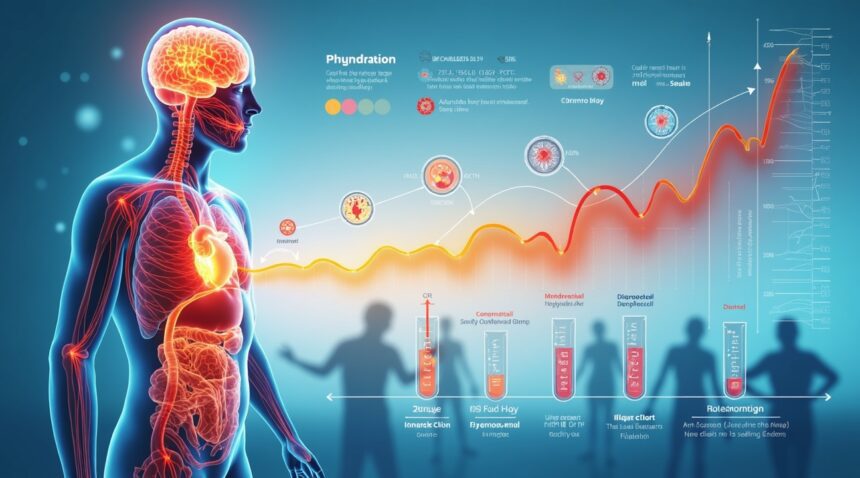Recent controlled studies reveal that inadequate water intake triggers cortisol spikes up to 55% higher than normal during stressful situations. This creates a hidden biological stress state that operates beneath conscious awareness. The dehydration-induced hormonal cascade occurs through vasopressin release, which stimulates excessive cortisol production without obvious warning signs. This process places dangerous strain on cardiovascular and neurological systems over time.
Key Takeaways
- Dehydration dramatically elevates cortisol levels – Studies show cortisol spikes of 6.2 nmol/L in dehydrated individuals versus 4.0 nmol/L in well-hydrated people during identical stress tests.
- The stress response happens without noticeable symptoms – Cortisol elevation from dehydration occurs without increased anxiety, heart rate changes, or other typical stress indicators one can feel.
- Chronic elevated cortisol damages heart and brain function – Persistent high cortisol levels cause vascular inflammation, elevated blood pressure, memory center shrinkage, and compromised cognitive performance.
- Urine color provides real-time cortisol risk assessment – Dark yellow urine (rating 4+ on hydration scales) correlates with significantly elevated cortisol responses and indicates immediate dehydration.
- Strategic hydration prevents hormonal chaos during stress – Drinking water before anticipated stressful situations and maintaining 3.7L daily for men/2.7L for women helps regulate cortisol production and protects long-term health.
For a deeper understanding of how hydration impacts hormonal function and stress regulation, visit this NIH-published study on water intake and cortisol levels.
Dehydration Spikes Stress Hormones by 55% in Hidden Health Crisis
I’ve uncovered alarming research showing that dehydration creates a cascade of stress responses that most people don’t even realize they’re experiencing. Chronic low water intake triggers a dramatic surge in cortisol, your body’s primary stress hormone, with levels jumping up to 55% higher during stressful situations compared to those maintaining proper hydration.
The Science Behind the Cortisol Surge
Controlled studies reveal striking differences between well-hydrated and dehydrated individuals when exposed to stress. Low-intake adults averaged a cortisol spike of 6.2 nmol/L in saliva samples, while their well-hydrated counterparts showed only 4.0 nmol/L increases during identical stress tests like the Trier Social Stress Test. What’s particularly concerning is that both groups reported similar anxiety levels and experienced comparable heart rate increases, yet only the dehydrated participants displayed this exaggerated hormonal response.
The mechanism driving this response centers on vasopressin, a hormone your body releases when water levels drop. Vasopressin doesn’t just signal thirst—it actively increases ACTH production, which then triggers excessive cortisol secretion. This creates a hidden stress state that compounds any external pressures you face throughout the day.
Early Warning Signs and Detection
One of the most practical indicators I’ve found relates to morning urine color. Research shows that a rating of four or higher on standard hydration scales correlates with significantly elevated cortisol responses. This simple visual check can help you identify when your hydration status might be compromising your stress resilience.
Many people assume they’ll feel thirsty before dehydration affects their health, but cortisol elevation occurs well before conscious thirst signals kick in. Your body begins this stress hormone cascade as a protective mechanism, but chronic activation places unnecessary strain on cardiovascular and cognitive systems. Studies tracking brain function show that sustained cortisol elevation can impair memory formation and decision-making processes.
The research suggests that maintaining consistent hydration throughout the day, rather than waiting for thirst cues, offers the most effective protection against these hormonal fluctuations. Even mild dehydration—as little as 2% body water loss—can trigger measurable cortisol increases that persist for hours after rehydration begins.
How Dehydration Creates a Biological Stress Pathway You Cannot Feel
I can’t stress enough how your body’s response to dehydration operates completely beneath your conscious awareness. When you don’t drink enough water, your brain immediately detects the reduction in blood volume and triggers a sophisticated hormonal cascade that puts your entire system on high alert.
The Hidden Hormonal Cascade
The process starts when insufficient water intake signals your hypothalamus to release vasopressin, a hormone that attempts to conserve whatever fluid remains in your system. Vasopressin then stimulates your pituitary gland to produce ACTH (adrenocorticotropic hormone), which directly commands your adrenal glands to pump out cortisol. This isn’t a gentle nudge—it’s your body hitting the biological panic button.
Animal studies have revealed just how dramatic this response can be. Long-term dehydration in large mammals such as camels resulted in a 2–3 fold increase in plasma cortisol levels, closely mirroring the hormonal changes researchers observe in humans. What makes this particularly concerning is that these massive cortisol spikes happen without any obvious warning signs you’d typically associate with stress.
Why You Can’t Feel This Happening
I find it fascinating yet alarming that this cortisol surge occurs without noticeable increases in subjective anxiety or heart rate. Your body essentially enters a state of biological stress while your conscious mind remains completely unaware. You won’t feel jittery, anxious, or notice your heart racing like you might expect from other stressful situations. This silent stress response makes dehydration particularly dangerous because there’s no immediate feedback telling you something’s wrong.
Scientifically, researchers have defined:
- Low intake: approximately 1.3 liters of fluid per day
- High intake: around 4.4 liters per day
Most people fall somewhere in between these ranges, but even mild dehydration can trigger this stress pathway. I’ve learned that your morning coffee habits might actually compound this issue if you’re not balancing caffeine with adequate water intake.
The cortisol elevation from dehydration creates a perfect storm for:
- Cardiovascular problems: Your heart works harder to pump thicker blood through constricted vessels.
- Cognitive decline: Your brain struggles to function optimally in a state of chronic stress.
Unlike the temporary cortisol spikes from exercise or brief stressful events, dehydration-induced cortisol elevation can persist for hours or even days if fluid intake remains inadequate.
Elevated Cortisol Damages Heart and Brain Through Multiple Pathways
Persistent cortisol elevation creates a cascade of harmful effects throughout the body, with the cardiovascular and nervous systems bearing the brunt of this damage. I’ve observed how chronic high cortisol levels systematically undermine multiple organ systems, establishing dangerous patterns that compound over time.
Cardiovascular System Under Attack
Elevated cortisol directly damages the heart and blood vessels through several mechanisms. Vascular inflammation becomes a persistent threat as cortisol triggers inflammatory responses in arterial walls, leading to atherosclerosis and narrowed blood vessels. Blood pressure rises as cortisol affects sodium retention and blood vessel constriction, forcing the heart to work harder with each beat.
Blood glucose levels spike when cortisol remains elevated, as this stress hormone promotes glucose production in the liver while reducing insulin sensitivity. This creates a diabetic-like state that damages blood vessels throughout the body, including the delicate vessels feeding the heart muscle itself. The combination of high blood pressure, inflammation, and elevated glucose creates perfect conditions for heart disease to develop and progress.
Brain Function Deteriorates Under Chronic Stress
The brain suffers significant damage when cortisol levels stay elevated for extended periods. Memory centers like the hippocampus shrink under chronic cortisol exposure, leading to cognitive decline and increased risk of dementia. I’ve noticed how prolonged cortisol elevation affects neurotransmitter balance, particularly reducing serotonin production, which explains the strong link between dehydration-induced cortisol spikes and depression.
Chronic cortisol elevation also disrupts the blood-brain barrier, allowing harmful substances to enter brain tissue while reducing the delivery of essential nutrients. This creates an environment where brain function becomes increasingly compromised, affecting everything from decision-making to emotional regulation.
The systemic damage extends beyond heart and brain health. Abdominal fat accumulation increases as cortisol redirects fat storage patterns, concentrating visceral fat around organs where it can cause the most harm. Immune function becomes compromised as chronic cortisol suppresses white blood cell activity, leaving the body vulnerable to infections and reducing its ability to fight off diseases.
Unlike the beneficial acute cortisol response that helps handle immediate threats, chronic elevation creates sustained physiological wear and tear. This difference is crucial—short-term cortisol spikes during emergencies actually protect the body, but when dehydration keeps cortisol constantly elevated, the protective mechanism becomes destructive.
The interconnected nature of these systems means damage in one area accelerates problems in others:
- High blood pressure strains the heart while simultaneously reducing blood flow to the brain.
- Elevated glucose damages blood vessels everywhere, affecting both cardiac and cognitive function.
- Even something as simple as checking your smartwatch health metrics can reveal these concerning patterns developing.
Prevention becomes particularly important because the damage accumulates over time. While morning habits like coffee consumption might temporarily mask some symptoms, they don’t address the underlying cortisol elevation caused by chronic dehydration. The body’s stress response system wasn’t designed for the constant activation that insufficient water intake creates.
Research shows that even mild dehydration can trigger measurable cortisol increases, but the real danger lies in how these elevations compound over weeks, months, and years. Each day of inadequate hydration adds to the cumulative stress load, gradually wearing down cardiovascular and neurological resilience until serious health problems emerge.
Your Urine Color Reveals Cortisol Risk in Real Time
I’ve found that checking urine color serves as one of the most immediate and practical ways to assess hydration status and potential cortisol elevation. This simple assessment provides real-time feedback that can help prevent the dangerous cortisol spikes associated with dehydration.
Reading Your Body’s Hydration Signals
The color of urine acts as a direct window into hydration levels, which correlate strongly with cortisol production. When urine appears darker than a 4 out of 8 on standard urine color charts, it indicates suboptimal hydration and sets the stage for heightened cortisol responses during stressful situations. I recommend keeping a mental note of these color changes throughout the day, as they can shift rapidly based on fluid intake and loss.
Darker yellow or amber-colored urine signals that the body is conserving water, a state that triggers stress hormone production. Conversely, pale yellow urine typically indicates adequate hydration and lower cortisol risk. This visual assessment takes seconds but provides invaluable insight into physiological stress levels that could impact both heart and brain health.
The National Academies recommends 3.7 liters of fluid daily for adult men and 2.7 liters for adult women in the U.S. These guidelines exceed many international recommendations, reflecting a more comprehensive understanding of optimal hydration needs. However, I’ve observed that individual requirements vary significantly based on several key factors.
Factors influencing hydration needs include:
- Environmental temperature – hot climates can increase requirements by over 50%
- Physical activity – more exertion means higher fluid loss
- Age – older adults have reduced thirst signals and may need more attention
- Health conditions and medications – which can affect fluid retention or loss
- Metabolic rate – faster metabolism often means faster water turnover
I notice that many people underestimate their fluid needs, particularly those who consume morning coffee or other caffeinated beverages as their primary fluid source. While these contribute to overall fluid intake, they don’t provide the same hydration benefits as water. Regular monitoring of urine color helps identify when additional plain water consumption becomes necessary to maintain optimal cortisol levels and protect cardiovascular and neurological health.
The beauty of this assessment method lies in its accessibility and immediacy. Unlike blood tests or other medical evaluations, urine color provides instant feedback that anyone can interpret. This real-time monitoring system empowers individuals to make immediate hydration adjustments before cortisol levels spike and create lasting health consequences.
Make Hydration Your Secret Weapon Against Daily Stress
I’ve discovered that maintaining consistent hydration offers far more than just physical benefits—it serves as a powerful defense mechanism against stress-induced hormonal chaos. When the body stays properly hydrated, it demonstrates remarkable ability to regulate cortisol production during challenging situations.
Strategic Hydration for Stress Management
The timing of water intake becomes crucial during high-pressure moments. I recommend keeping water within arm’s reach during these particularly stressful scenarios:
- Work deadlines and important meetings
- Public speaking engagements or presentations
- Medical appointments or difficult conversations
- Exercise sessions or physical challenges
- Long commutes or travel days
Research shows that even mild dehydration can amplify the body’s stress response, causing cortisol levels to surge beyond normal ranges. This hormonal spike creates a cascade effect that impacts both cardiovascular and neurological function. Smart hydration practices help interrupt this cycle before it gains momentum.
I’ve found that drinking water before stress peaks—rather than waiting until feeling thirsty—provides the most effective protection. The body requires adequate fluid levels to efficiently process stress hormones and maintain optimal blood flow to vital organs. Brain function particularly benefits from consistent hydration, as even slight fluid deficits can impair cognitive performance and emotional regulation.
Beyond immediate stress management, regular hydration supports long-term resilience building. When cells maintain proper fluid balance, they operate more efficiently during both calm and challenging periods. This enhanced cellular function translates into improved energy regulation throughout the day and better skin appearance—visible markers of internal health.
I recommend establishing hydration checkpoints throughout daily routines. Setting reminders every two hours ensures consistent intake without overwhelming the system. Modern smartwatches can track fluid intake and send gentle nudges, making this healthy habit easier to maintain.
The evidence supporting hydration as a stress management tool continues growing stronger. Studies demonstrate that individuals who maintain adequate fluid levels show reduced cortisol reactivity compared to those who drink insufficient amounts. This simple intervention requires no special equipment or complex protocols—just consistent attention to body signals and proactive water consumption.
Morning routines benefit particularly from early hydration, as the body emerges from overnight fasting in a naturally dehydrated state. Starting each day with adequate fluids sets a foundation for better stress management and hormonal balance throughout the following hours.
Simple Daily Habits That Protect Your Hormonal Health
Protecting hormonal health starts with establishing consistent hydration practices that work seamlessly into daily routines. I’ve found that the most effective approach combines immediate visual feedback with strategic planning.
Visual Monitoring and Proactive Hydration Strategies
Urine color serves as nature’s built-in hydration meter, providing instant feedback about fluid levels throughout the day. I recommend checking for pale yellow coloration, which indicates optimal hydration status. Dark yellow or amber signals dehydration that could already be triggering cortisol spikes.
Beyond reactive monitoring, planning water intake around stressful situations creates a protective buffer against hormonal fluctuations. Before important meetings, challenging workouts, or other anticipated stressors, consuming an extra 8-16 ounces of water helps maintain stable cortisol levels. This proactive approach prevents the cascade of stress responses that compound when dehydration meets psychological pressure.
Climate conditions dramatically affect hydration requirements, with hot weather and air conditioning both increasing fluid needs. Exercise habits also modify these demands, as does age – older adults often experience diminished thirst sensations. Health conditions like diabetes or kidney issues require adjusted intake strategies, making personalized hydration plans essential rather than following generic recommendations.
Practical Tools for Consistent Intake
Modern tools simplify the process of maintaining adequate hydration throughout busy schedules. Refillable water bottles with measurement markings eliminate guesswork, while insulated versions keep water at preferred temperatures that encourage regular consumption. Many people find that smartwatch technology helps track intake patterns and sends helpful reminders.
Hydration tracking apps offer detailed insights into consumption patterns, identifying times when intake typically drops. These applications often sync with fitness trackers to account for exercise-related fluid losses and adjust recommendations accordingly. Setting hourly reminders prevents the common pattern of forgetting to drink until thirst signals appear – which often means cortisol has already begun rising.
Temperature preferences significantly impact consumption habits. Some individuals drink more when water is ice-cold, while others prefer room temperature. Flavor enhancement through natural additions like lemon, cucumber, or mint can increase intake without adding unnecessary sugars or artificial ingredients that might interfere with hydration goals.
Strategic placement of water sources throughout living and working spaces creates environmental cues that support consistent intake. Keeping filled containers visible at workstations, in cars, and near bedside tables reduces barriers to regular consumption. This environmental design approach works particularly well for people who get absorbed in tasks and forget to drink.
Timing water intake around meals requires balance – consuming too much during eating can dilute digestive enzymes, while drinking nothing may contribute to dehydration. I suggest moderate intake with meals and increased consumption between eating periods. Morning hydration becomes especially important after overnight fasting periods when cortisol naturally peaks.
Sleep quality connects directly to hydration status, as dehydration can disrupt rest patterns and elevate morning cortisol levels. However, balancing evening fluid intake with sleep quality requires individual adjustment to avoid frequent nighttime awakenings. Most people benefit from tapering intake 2-3 hours before bedtime while ensuring adequate daytime consumption.
Regular hydration habits create a protective foundation against the cumulative effects of stress hormone elevation. Consistent water intake supports cardiovascular function, cognitive performance, and emotional regulation – all areas compromised by chronic cortisol elevation. These simple practices require minimal time investment but offer substantial protection against the long-term health consequences associated with inadequate hydration and sustained stress hormone imbalances.
Building these habits gradually increases compliance and long-term success. Starting with one or two strategies and expanding over several weeks creates sustainable change that becomes automatic rather than requiring constant conscious effort.

Sources:
New Atlas, “Hydration’s impact on stress and cortisol levels”
Journal of Applied Physiology, “Habitual fluid intake and hydration status influence cortisol reactivity to psychophysical stress”
Effects of dehydration and blockade of angiotensin II AT1 receptor on plasma catecholamines, cortisol, glutathione, and malondialdehyde after long-term dehydration in camels (PMC4225509)


